《大学英语读写》课程教学资源(A)Ⅱ_大学英语读写(A)Ⅱ_Book3.Unit3A.exercises

ExercisesReading and understandingDealing with unfamiliar wordsReading and interpretingDeveloping critical thinking
Reading and understanding Dealing with unfamiliar words Reading and interpreting Developing critical thinking Exercises
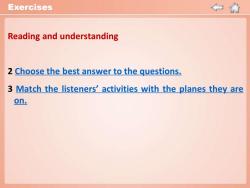
ExercisesReadingandunderstanding2Choosethebestanswertothequestions.3 Match the listeners'activities with the planes they areon
Reading and understanding 2 Choose the best answer to the questions. 3 Match the listeners’ activities with the planes they are on. Exercises

Exercises2Choosethebestanswertothe questions1 Why does the writer divide listening to music into threetypes ofexperience?(a) It is important to keep the different types ofexperience separate.(b) It makes it easier to understand what is happeningwhen we listen to music.(c) It is the traditional way of referring to the experienceoflistening(d) Different people listen on different planes, accordingtothe typeof persontheyare.More
2 Choose the best answer to the questions. 1 Why does the writer divide listening to music into three types of experience? (a) It is important to keep the different types of experience separate. (b) It makes it easier to understand what is happening when we listen to music. (c) It is the traditional way of referring to the experience of listening. (d) Different people listen on different planes, according to the type of person they are. Exercises
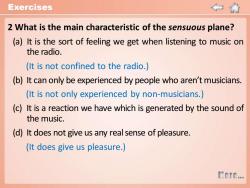
Exercises2 What is the main characteristic of the sensuous plane?(a) It isthe sort of feeling weget when listening to music onthe radio.(ltisnot confined totheradio.)(b) It canonlybe experienced by people who aren'tmusicians.(Itisnotonlyexperiencedbynon-musicians.)(c) It is a reaction we have which is generated by the sound ofthe music.(d) It does notgiveus any realsense of pleasure(lt does give us pleasure.)More
2 What is the main characteristic of the sensuous plane? (a) It is the sort of feeling we get when listening to music on the radio. (It is not confined to the radio.) (b) It can only be experienced by people who aren’tmusicians. (It is not only experienced by non-musicians.) (c) It is a reaction we have which is generated by the sound of the music. (d) It does not give us any realsense of pleasure. (It does give us pleasure.) Exercises

Exercises3 What is the main characteristic of the expressive plane?(a)Itcanonlybeexperiencedbyintelligentpeople(lt is not a matter of intelligence.)(b) It is when we believe the composer is communicatingsomething to us.(c) It is a controversial concept; some composers don'tthink it exists.(Although it is controversial, composers don't say itdoesn't exist.)(d)It ismost obviouslyapparent inthemusicof Stravinsky(ItisnotmostobviousinStravinsky'smusic.)More
3 What is the main characteristic of the expressive plane? (a) It can only be experienced by intelligent people. (It is not a matter of intelligence.) (b) It is when we believe the composer is communicating something to us. (c) It is a controversial concept; some composers don’t think it exists. (Although it is controversial, composers don’t say it doesn’t exist.) (d) It is most obviously apparent in the music of Stravinsky. (It is not most obvious in Stravinsky’s music.) Exercises

Exercises4 What is the main characteristic of the musical plane?(a)ltcanonlybe experiencedbypeoplewhohavestudiedtoread music.(Althoughstudyingmusichelps,you can experiencethis plane by careful listening, and you don't need toread music.)(b)It is theabilityto experiencedifferent musicalelements(c) It is the plane that we experience instinctively, withoutrealizing it.(Thereisnomentionofinstinct.)(d)Itistheeasiestofthethreeplanestoappreciate.(It maythe hardest for mostbelistenerstoappreciate.)More
4 What is the main characteristic of the musical plane? (a) It can only be experienced by people who have studied to readmusic. (Although studying music helps, you can experience this plane by careful listening, and you don’t need to read music.) (b) It is the ability to experience different musical elements. (c) It is the plane that we experience instinctively, without realizing it. (There is no mention of instinct.) (d) It isthe easiest ofthe three planes to appreciate. (It may be the hardest for most listeners to appreciate.) Exercises
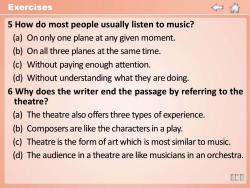
Exercises5How do mostpeopleusuallylistento music?(a)Ononlyoneplaneatanygivenmoment(b) On all three planes at the same time.(c) Without paying enough attention.(d) Without understanding what they are doing6 Why does the writer end the passage by referring to thetheatre?(a)Thetheatrealsooffersthreetypesofexperience.(b) Composers are like the characters in a play.(c) Theatre is the form of art which is most similar to music.(d) The audience in a theatre are like musicians in an orchestra.END
5 How do most people usually listen to music? (a) On only one plane at any given moment. (b) On all three planes atthe same time. (c) Without paying enough attention. (d) Without understanding what they aredoing. 6 Why does the writer end the passage by referring to the theatre? (a) The theatre also offersthree types of experience. (b) Composers are like the charactersin a play. (c) Theatre isthe formof art which is mostsimilarto music. (d) The audience in a theatre are like musiciansin an orchestra. Exercises

Exercises3Matchthe listeners'activities withtheplanes theyare on.(a)sensuous plane(b)expressiveplane(c)musical plane1 They understand the way the composer is thinking(c) musical plane(They follow the line of the composer's thought with theofandmelodies,manipulationnotes,,rhythms,harmonies.)2 They are doing something else at the same time.(a)sensuousplane(Theylistenabsent-mindedlyordriftintoadream.)More
3 Match the listeners’ activities with the planes they are on. (a) sensuous plane (b) expressive plane (c) musical plane 1 They understand the way the composer is thinking. (c) musical plane (They follow the line of the composer’s thought with the manipulation of notes, melodies, rhythms, and harmonies.) 2 They are doing something else at the same time. (a) sensuous plane (They listen absent-mindedly or drift into a dream.) Exercises
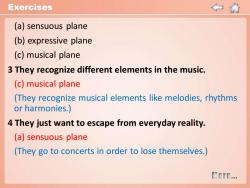
Exercises(a)sensuousplane(b)expressiveplane(c) musical plane3They recognize different elements in themusic.(c) musical plane(They recognize musical elements like melodies, rhythmsorharmonies.)4They just want to escapefrom everydayreality(a)sensuousplane(They go to concerts in order to lose themselves.)More
(a) sensuous plane (b) expressive plane (c) musical plane 3 They recognize different elements in the music. (c) musical plane (They recognize musical elements like melodies, rhythms or harmonies.) 4 They just want to escape from everyday reality. (a) sensuous plane (They go to concerts in order to lose themselves.) Exercises
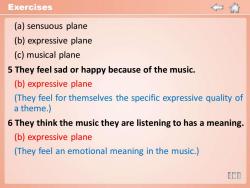
Exercises(a)sensuousplane(b)expressiveplane(c) musical plane5Theyfeelsadorhappybecauseofthemusic.(b)expressiveplane(They feel for themselves the specific expressive quality ofatheme.)6 They think the music they are listening to has a meaning(b) expressive plane(Theyfeelanemotional meaninginthemusic.)END
(a) sensuous plane (b) expressive plane (c) musical plane 5 They feel sad or happy because of the music. (b) expressive plane (They feel for themselves the specific expressive quality of a theme.) 6 They think the music they are listening to has a meaning. (b) expressive plane (They feel an emotional meaning in the music.) Exercises
按次数下载不扣除下载券;
注册用户24小时内重复下载只扣除一次;
顺序:VIP每日次数-->可用次数-->下载券;
- 《大学英语读写》课程教学资源(A)Ⅱ_大学英语读写(A)Ⅱ_Book3.Unit3.language in use.ppt
- 《大学英语读写》课程教学资源(A)Ⅱ_大学英语读写(A)Ⅱ_Book3.Unit5A.exercise.ppt
- 《大学英语读写》课程教学资源(A)Ⅱ_大学英语读写(A)Ⅱ_Book3.Unit5.language in use.ppt
- 《大学英语读写》课程教学资源(A)Ⅱ_大学英语读写(A)Ⅱ_Book3.Unit6B.exercises.ppt
- 《基础日语》课程教学课件(PPT讲稿)第16課 春節.ppt
- 《基础日语》课程教学课件(PPT讲稿)第17課 コンサート.ppt
- 《基础日语》课程教学课件(PPT讲稿)第18課 病気 ユニット1 診察.ppt
- 《基础日语》课程教学课件(PPT讲稿)第18課 病気 ユニット2 お見舞い.ppt
- 《基础日语》课程教学课件(PPT讲稿)第18課 病気 ユニット3 読解文 高橋さんの日記.ppt
- 《基础日语》课程教学课件(PPT讲稿)第19課 黄砂 ユニット1.pdf
- 《基础日语》课程教学课件(PPT讲稿)第19課 黄砂 ユニット2 家族からの電話.pdf
- 《基础日语》课程教学课件(PPT讲稿)第19課 黄砂 ユニット3 読解文.pdf
- 《综合英语》课程教学资源Ⅲ_45669_课程资源_Translation exercises_Answers.doc
- 《综合英语》课程教学资源Ⅲ_45669_课程资源_词汇及释义_Unit 1.ppt
- 《综合英语》课程教学资源Ⅲ_45669_课程资源_词汇及释义_Unit 3.ppt
- 《综合英语》课程教学资源Ⅲ_45669_课程资源_词汇及释义_Unit 4.ppt
- 《综合英语》课程教学资源Ⅲ_45669_课程资源_词汇及释义_Unit 5.ppt
- 《综合英语》课程教学资源Ⅲ_45669_课程资源_词汇及释义_Unit 8.ppt
- 《综合英语》课程教学资源Ⅲ_45669_课程资源_词汇及释义_Unit 11.ppt
- 《综合英语》课程教学资源Ⅲ_45669_课程资源_词汇及释义_Unit 12.ppt
- 《大学英语读写》课程教学资源(A)Ⅱ_大学英语读写(A)Ⅱ_Book3.Unit1A.课堂讨论课文所用课件.ppt
- 《大学英语读写》课程教学资源(A)Ⅱ_大学英语读写(A)Ⅱ_Book3.Unit1A.exercises.ppt
- 《大学英语读写》课程教学资源(A)Ⅱ_大学英语读写(A)Ⅱ_Book3.Unit1A.Text.ppt
- 《大学英语读写》课程教学资源(A)Ⅱ_大学英语读写(A)Ⅱ_Book3.Unit1A.words to note.ppt
- 《大学英语读写》课程教学资源(A)Ⅱ_大学英语读写(A)Ⅱ_Book3.Unit6B.text organization1..ppt
- 《大学英语读写》课程教学资源(A)Ⅱ_大学英语读写(A)Ⅱ_Book3.Unit6B.words to note.ppt
- 《大学英语读写》课程教学资源(A)Ⅱ_大学英语读写(A)Ⅱ_Writing:English Paragraph Development.ppt
- 《大学英语读写》课程教学资源(A)Ⅱ_大学英语读写(A)Ⅱ_Book3.Unit5A.text organization.pdf
- 《大学英语读写》课程教学资源(A)Ⅱ_大学英语读写(A)Ⅱ_Book3.Unit3.English paragraph writing.ppt
- 《大学英语读写》课程教学资源(A)Ⅱ_大学英语读写(A)Ⅱ_Book3.Unit3A.language points.ppt
- 《大学英语读写》课程教学资源(A)Ⅱ_大学英语读写(A)Ⅱ_Book3.Unit3A.text organization.ppt
- 《大学英语读写》课程教学资源(A)Ⅱ_大学英语读写(A)Ⅱ_Book3.Unit1.Writing1.ppt
- 《大学英语读写》课程教学资源(A)Ⅱ_大学英语读写(A)Ⅱ_Book3.Unit1A.language points.ppt
- 《大学英语读写》课程教学资源(A)Ⅱ_大学英语读写(A)Ⅱ_Book3.Unit8A.课文原文.ppt
- 《学科英语》课程教学资源(文献资料)预习阅读材料10.doc
- 《学科英语》课程教学资源(文献资料)预习阅读材料9.doc
- 《学科英语》课程教学资源(文献资料)预习阅读材料8.doc
- 《学科英语》课程教学资源(文献资料)预习阅读材料7.doc
- 《学科英语》课程教学资源(文献资料)预习阅读材料6.doc
- 《学科英语》课程教学资源(文献资料)预习阅读材料5.doc
